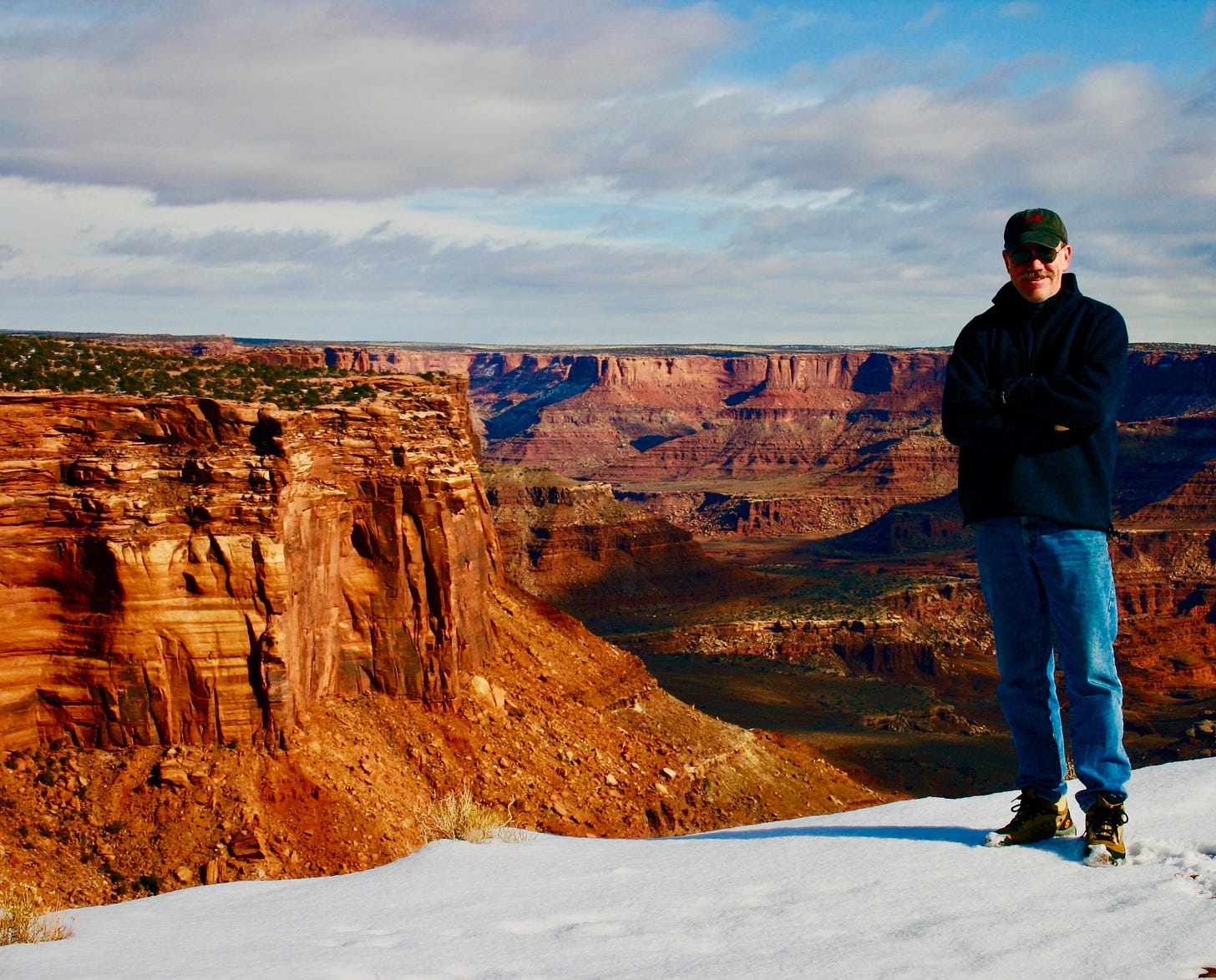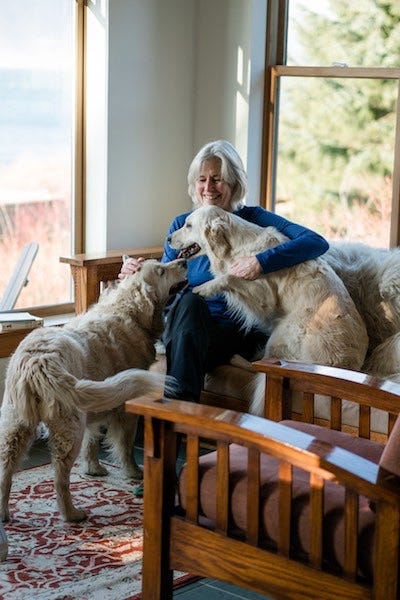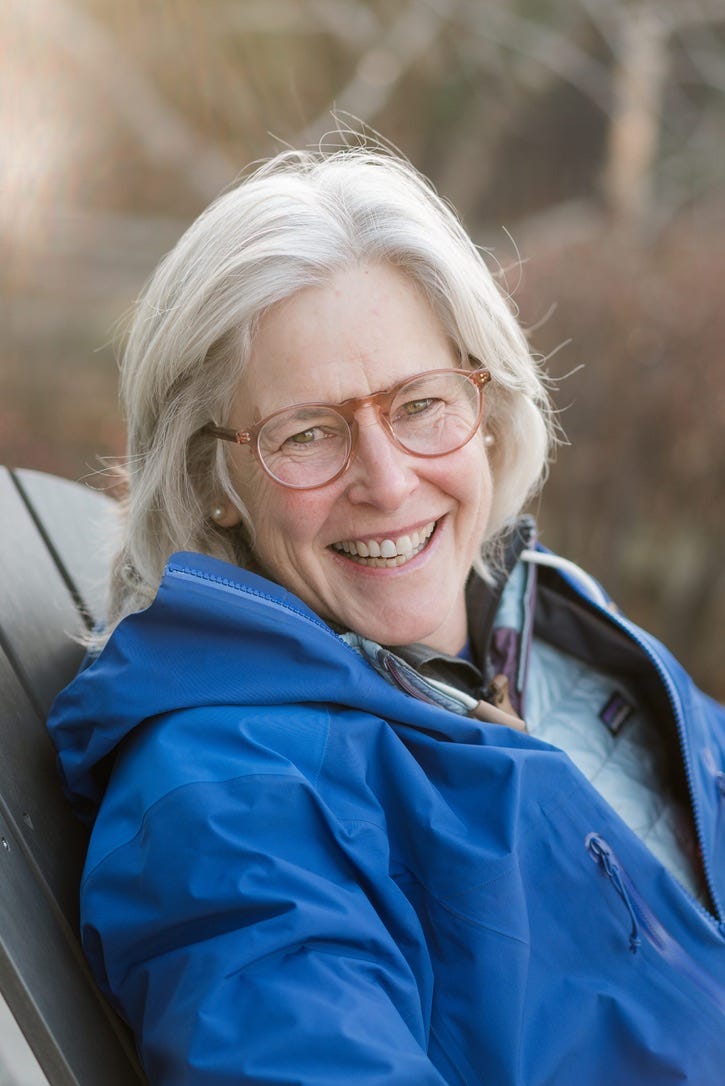“Either we're all ordinary, or else none of us is ordinary.” ― Carol Shields
In this issue
This week brings something a little different and special: the highlights of two wonderful conversations which gave me more joy than I’ve had in these past months, even though we spent most of the time talking about death. In the spirit of tomorrow’s holidays — All Saints Day and Dia de los Muertos (Day of the Dead) — here’s what they shared with me about celebrating a life with a well-written obituary.
One last chance to make sure you are ready to vote. Click here for information on how to make sure your vote counts.
And, of course, your moment of Zen
The story of a life begins at death
A few weeks ago, Heather Lende took a phone call in her kitchen from the mother of 32-year-old Ellen Rasmussen, picked up her pen and notepad, and began to take the careful notes she would need to write Ellen’s obituary for the Chilkat Valley News in Haines, Alaska.
Around the same time, more than three thousand miles east and south of Haines, Bryan Marquard was putting the final touches on the obituary of Donald MacGillis, a former colleague and hiker, for The Boston Globe.
Lende and Marquard work the “dead beat,” as writer and obituary addict Marilyn Johnson dubbed the work of obituary writing in of her 2006 book, “The Dead Beat: Lost Souls, Lucky Stiffs, and the Perverse Pleasures of Obituaries.” They endeavor to capture the essence of a life in a several hundred words. If they get it right, the family and friends of the deceased find it a little easier to say goodbye, the rest of us become witnesses and, if you are like me, you are drawn again into the eternal question: what is a life well-lived?
***
“Ellen Maureen Rasmussen, the oldest of Greg and Marianne Rasmussen's three children, was born at her parents' rural Mosquito Lake home, 12 weeks early on Feb. 22, 1987. It was 23 below with sparkling snow underneath a bluebird sky. "The Volkswagen barely started," Greg said. Stabilization occurred at the Haines clinic and at Bartlett Regional Hospital before the evening arrival at Providence Hospital in Anchorage. The neonatal intensive care doctor warned that she probably wouldn't survive the night. After five months in Providence Hospital in Anchorage the family returned to their off-the-grid home. Friends and neighbors, the Haines clinic, REACH, and the school district all helped with Ellen's needs from the very beginning. Her feeding pumps were charged at the U.S.-Canada border station and at the Mosquito Lake School.
"They say it takes a village to raise a child, and it's so true, especially in Ellen's case," Marianne said.” - Obituary for Ellen Rasmussen, Chilkat Valley News, October 10, 2020.
***
I love reading obituaries and I’m not alone. I read for what is there: the unusual nickname, the surprising detail, the unexpected nugget of information about a time, a place, or a vocation that I might never have heard about. I read for what isn’t there: the children never born, hints of a life sought but denied, questions that seem to be unanswered. I read them because people are the most interesting news of the day -- their arrival and departure are stark reminders of the parameters of each life, including my own. Finally, there is the music of a story when it is in the hands of someone who wants to get it right.
***
“Donald MacGillis wrote about the wilderness with such reverence that his prose edged toward poetry as he led readers across rugged terrain.
“A walk in an old-growth forest is really a clamber,” he said of a Vermont hike in one of his editorial notebooks — brief essays that he elevated into an art form during his years as an editor at the Globe.
Into the wilderness he often walked, and it was atop Mount Katahdin in Maine, a place he loved and liked to revisit, that an accidental 50-foot fall led to his death on Wednesday, at 74. A careful hiker, Mr. MacGillis left only footsteps — and crisp, graceful writing as bracing as mountain air.” - Obituary for Donald MacGillis, Boston Globe, October 10, 2020.
***
The obituary is part news, part ritual, and, especially lately, the only way many of us have to honor and celebrate a life. It seems right to take a closer look on this weekend of All Saints Day and Dia de los Muertos or Day of the Dead. So, I asked Lende and Marquard who have spent a large chunk of their lives writing the stories of the dead to share what it takes, how they do it, and how this work shapes their own lives. Here is a look at what they’ve learned about writing obituaries, about grief, and about themselves and life along the way.
An accident becomes a calling
Both Lende and Marquard stumbled into what has become a calling as much as a job. All told, Bryan Marquard has written nearly 2,300 obituaries over the past fifteen years and Heather Lende has written over 500 since 1996.
Marquard’s headshot on The Boston Globe website shows a man with kind yet observant eyes, neither quality a surprise after viewing his Instagram photos of the changing seasons outside his New Hampshire home, the soulful face of his aging rescue dog, and the bear cubs who live at a nearby sanctuary. He speaks about his work with assurance, honesty, and, always, great care -- pausing to replay what he’s said to make sure he’s gotten it right. Marquard set out to study music only to realize he had “more ambition than talent.” Writing always came easily and he “accidentally fell into” journalism while still in college. He wrote his first obituaries for the Cincinatti Enquirer and discovered then the power they have to create a connection in the wake of loss. “They were the only stories I wrote for the Enquirer for which I received mail.”

(Above: Bryan Marquard, standing on the edge at Canyonlands National Park)
Even after moving on to Newsday, and then to papers throughout New England before landing at The Boston Globe in 2000, he was constantly drawn to the stories of people and wrote many profiles. “I fell in love with biographies in third grade and have read them ever since. It’s fascinating work to try to capture an entire life in a fairly short form. It’s still just a sliver of that life but so is biography. No matter how many words you have or how many additional voices you bring in, it’s still just a sliver. I look at the challenge of capturing a life in those few words and making readers feel they know someone they’ve never met or, in many cases, never heard of, before reading the obituary.” This fascination is in part, what drove him to persuade his editors at The Boston Globe to give him the job of obituary editor fifteen years ago when the paper was reorganizing.
Lende’s own ”accidental” origins as an obituary writer have been well-documented. She’s the author of four popular books, each informed in some way by the experience of brushing up against death as life plays out in a small, remote, Alaksan town where everyone knows everyone else, at least a little, everyone has more than one job, and death is a community affair. When, in 1996, she asked the recently widowed writer of the “Duly Noted” column for the Chilkat Valley News how she could help, her friend handed over her notebook and said, “Do this.” Not long afterwards, a dying woman who did not like a new reporter “from down south” and asked Heather to write her obituary when the time came. “She told me, if you can write about life, you can write about death,” Lende recalled with a laugh. “I’ve been doing it ever since.”


(Above: Heather Lende, at home in Haines, Alaska)
When she speaks about her work and the town, a spark of what can only be called joy leaps from the Zoom screen we share for an hour. It is visible in the way her eyes shine with remembered tears one minute, and then crinkle in laughter the next. Both tears and laughter are part of the obituary writer’s life. They have to let it all in. Only then, can they write the story.
Qualifications: an almost endless capacity for the grief of others
“The first time I hear someone's voice break, I tell them to take all the time they need.” Marquard says. “It helps if you’ve gone through a few losses before getting a job like this,” Marquard says. “I’ve gone through a lot of them. In one year four relatives died and then a friend ended his life by suicide. When I called someone to do an interview for an obituary, I could open up to their grief. It is a key component of my job.”
“I’m a reasonably good writer, I know my strengths and my weaknesses, but I am good at listening to people and perhaps helping as they find their way through their grief. I’m not the be-all and end-all but I know from the cards and emails I’ve received afterwards that a lot of people appreciate the conversations we’ve had, not just what I’ve written.”
“You take on the grief,” Lende says. “It’s in my pores sometimes. There’ll be times when I’m ready to quit, especially after a young person dies or there is a suicide. It is very very difficult and I’ll say that’s it, I’m not going to do another one. These are going to kill me. Then someone will call me up and say “Mom really wanted you to do this, and I realize I can help. I have for lack of a better term, some kind of calling. I can do it. I’m able to. I can feel it deeply inside me.”
Distance helps
The phone is Marquard’s friend. He does almost all his interviews by phone which creates a way for families to speak more freely and for him to maintain a professional distance. He figures he’s done over 9,000 interviews by now.
“It’s so important to have someone to just listen to them,” Marquard says. “When you lose a loved one, you have a lot of conversations with other people who knew your loved one. They offer condolences but you must also console them. I’m the one person who drops into your life to whom you do not have to offer condolences. That’s an enormous gift to some people. Because we are speaking on the phone, we don’t have to register each other’s facial expression and they can cry. People cry all the time. No one feels they have to be composed.”
Lende agrees that it helps people to know they don’t have to worry about her emotionally, although, more often than not, she must create that sense of distance at the kitchen table of a close neighbor or friend. “I might be over there right after a death with all the others but when it is time for the obituary, it’s as though they know I’m putting on a different hat.”
“Because of the rituals in this town, we all have a role to play,” Lende says. “Some cook, some organize the wake, some do the music. I do this. They’ll say get Heather, she’ll do the obituary.”
“I sit down with the notebook and tell them how we are going to do it, I keep it very matter of fact. I think that’s a relief sometimes compared to the way they’ve been with other people. I don’t ask them to emote. If they want to, I'm there, and I'm a receptive listener. I give them the opportunity to get this chore done and I help with that.”
Distance is more challenging to create when the subject of the obituary is someone the writer knows.
“I try not to write about people I know,” says Marquard. “Obviously if it is a colleague, no news organization is a huge city. In those cases, I go out of the way not to be in the circle people bringing food to a person’s house. They deserve a dry-eyed obituary writer. I go out of my way to be professional and give them every inch of professionalism I would give anyone else.”
He had to summon every bit of his professionalism when Laura Levis, the wife of colleague Peter DeMarco tragically collapsed outside the doors of Somerville Hospital during an asthma attack in 2016 and died several days later. For the first time, he used the first person in the obituary because ethics told him he had to let the readers know of his ties to both of them. He sat with DeMarco and interviewed him face-to-face for a deeply memorable four hours.
***
“We never know when a conversation with a loved one will be our last, and there was nothing momentous about that final phone call between Laura Levis and her husband, Peter DeMarco. They had been planning Friday night nachos, a Saturday picking apples.
Only later did he realize her closing words — “I love you” — were the last he’d ever hear her speak.
Laura was 34 when she stopped breathing during a severe asthma attack. Paramedics revived her strong heart several minutes later and she lived six more days before dying on Sept. 22. “I am trying to keep my head above water in an ocean of grief,” Pete texted me from the hospital a day after she collapsed. “I am shaking as I type this.”
If we’re lucky our lives are love stories – poems that never end.” Obituary for Laura Levis, Boston Globe, October 18, 2016
***
“I know almost everybody I write about one way or another,” Lende says. “I can sort of levitate above it. I’m able to be in it and out of it at the same time. I don’t know where it comes from, survival instinct maybe… I say to myself, what if I’m in a drone hovering above? I can see who is holding someone’s hand, hear the story someone is telling.”
Sometimes she must remove herself physically. “There was one that was very difficult, one of my son’s best friends — his parents were godparents of my son — he killed himself. It happened in their house so we invited them to come to our house so people could gather. My friend asked me to do the obituary and the eulogy and I’m right in the middle of it. I ended up going to the library to write them. That was hard. but I just knew they couldn’t do it and I could, so I did. I wanted to do it for them.”
Whose story gets to be told?
In tiny Haines, Alaska, every death is news, Lende says, although that does not mean she writes every obituary. Sometimes another reporter will write one, or, as happens more and more in papers across the country, the family will pay to have one they have written or commissioned to be placed in the paper. Still, the emphasis in the Chilkat Valley News obituary pages remains squarely on those who lived, died, or had an enduring connection with the town. Famous people don’t necessarily make the cut.
***
“In many ways [Norman] Blank led the quintessential Haines life. His first jobs were working in the woods for the Schnabel Lumber Company and bartending at the Harbor Bar. Soon he was working for the Alaska Department of Fish and Game, which hired him in 1961 as the area’s first wildlife protection officer, a post he held for four years and quit rather than transfer to Sitka. He worked as a carpenter and fished commercially on the F/V Aries from 1978-1995 with his daughters as deck hands.
"We weren’t highliners," Lisa Blank said. "We were average. We liked to sleep." Norman Blank, Obituary, Chilkat Valley News, June 23, 2011
***
In Boston, it’s another story. As a paper of record for a large region, the obituary section is well populated with the famous or otherwise distinguished, their stories written by obituarists whose work is syndicated among many papers. Marquard’s job is to select the ones he feels are most important to run but the much more difficult part of his job is deciding whose story the Globe staff -- and that means Marquard himself -- will write. Requests stream in by email and phone. Colleagues and bosses make recommendations and a large number of obituaries fall into what, for want of a better term, Marquard calls the “musts.” These are people who have high-ranking jobs in all fields, from academia and medicine to the legal, business, sports and financial communities. The demographics tilt in one direction: white, relatively well-off, men age 75 or older who dominated these jobs during their working lives. As editor, Marquard has spent the past 15 years seeking out obit subjects who are one or more of the following: women, LGBTQ, not affluent, not old, and had nothing to do with the power-structure institutions. The poor, the homeless, are a particular challenge because few advocate for them. And many leave few tracks for the obituary writer to follow. Still it is possible to get the story, as Marquard showed in his obituary for Stella May Brown Weaco who lived on the streets of Boston summer and winter for 25 years, “maybe more.”
***
“The last departing train signaled to Stella May Brown Weaco that it was time to leave South Station, where she lingered each night before heading out for her solitary walk along city streets. In wilting humidity and bitter blizzards, she pushed a carriage with her belongings on a migratory route through Boston's nocturnal neighborhoods.
"I remember seeing her on the coldest, snowiest night you could imagine," said Dr. Jim O'Connell, president of Boston Health Care for the Homeless, who first encountered Stella in 1985. "We would be frightened for her health, but she would politely decline our offers to take her someplace to spend the night. She was robust in the true sense of the word.”
Arthritic and creaky, Stella finally agreed to stay at the Pine Street Inn shelter less than three years ago, and moved into Ruggles Assisted Living in March, after doctors discovered she had cancer. During her final days in Massachusetts General Hospital, she was not alone. Friends kept vigil day and night, and six were with Stella when, at 67, she died Dec. 31.” - Stella May Brown Weaco’s Obituary, Boston Globe, January 9, 2009
***
Getting it right: Rosie Ruiz and a man called Lucky
Sometimes researching the life of an obituary subject is straightforward because they’ve led what both Lende and Marquard refer to as a “well-documented life” with lots of verifiable dates and facts. With some well-known figures, there is so much information available they could write an obituary without interviewing a single person. More often, though, they want to. Those voices of loved ones, friends, or someone who knew the subject, can help the writer find the telling detail that brings the subject’s life into sharp focus. ("We weren’t highliners," Lisa Blank said. "We were average. We liked to sleep." ) It is risky, though, to rely exclusively on these interviews as Lende found when the family of a man named “Lucky” died.
“Often a family has a story but it’s just not right. The survivors of one man told me he had 13 Purple Heart medals, that he’d been at Pearl Harbor and lost his leg, arm, and an eye. These were all stories he’d told them. I asked the head of the American Legion if that was even possible and he said no. I did the math and he’d only have been 13 at Pearl Harbor. None of it was true,” she said. In the obituary, though, she didn’t point out the mistakes. “I just wrote what I could prove was true.”
Marquard faced a dilemma when he’d heard that a woman named Rose Ruiz died last year in a Florida nursing home. The name Rosie Ruiz was famous in Boston after she faked winning the Boston Marathon in 1980. “I was cautious about running the obituary because she had such a large reputation for deception,” Marquard says. He held the obit for days trying to verify the subject’s identity until the Washington Post ran it and forced his hand. He also ran this piece “I chased details about Rosie Ruiz’s life; she outdistanced me.” The obit itself is a study in how to write about a death of a person whose entire life was dominated by a lie.
When they conduct their interviews, they are listening for the quotes that will illuminate and carry the reader through. Lende makes sure she asks every person she speaks to two questions: What did you love about them? What did they love?
“The friend who went moose hunting will answer this one way, the spouse or children another, and yet another person will come up with an entirely different perspective,” Lende says. “You get specifics, details - yes he was generous but how did love to show his generosity? You can find out who they really were.”
It becomes part of you
The easy part of their job is what would be difficult for most people, certainly many writers: they still their own voices so the voices of their subjects can filter through. The hard part is the weight of accumulated grief and, for Marquard, the hundreds of letters or emails he sends to families explaining why he cannot write an obituary because he knows they are mourning a loss every bit as valuable to them as those reflected in the obits that are published.
When I ask Lende and Marquard about the effects of years and years of opening up and allowing the grief of others to flow through them onto the printed page, I expect them to talk about hikes into the mountains, or hugging and walking their dogs. Instead, they tell me that the work, hard as it is, also restores them. When they go out into the beauty that surrounds their homes, they carry the work with them.
“The best way for me to get out of my head is to pick up the phone and call somebody to do an interview,” says Marquard. As for his hikes in the woods, sometimes he finds himself writing as he walks. “I do my best writing when I’m not looking at the screen,” he says. “I was walking when the key sentence for Laura Levis’ obituary came to me: “Sometimes if we are lucky our lives are love stories.” When he walks and when he writes, he cocks his musically-trained ear to listen for the right rhythm, the right music that will unconsciously filter into a reader’s ear as they read.
For Lende, the wildness and seasons that unfold around her only reinforces the lessons about life and gratitude that come with every obituary. “Death is supposed to shake us up,” she says. “We’re supposed to pay attention. The only difference is that most people deal with a death and then have time to recover before the next one. I’m constantly confronted with death. There’s the pain but there is also this gratitude.”
She goes on.
“I was brought up Episcopalian and you hear that psalm our days our numbered and like leaves we bloom and then we blow away. Part of this obviously has to do with being in Alaska — the seasonal changes — you can’t miss it. It hits you over the head. Stuff dies. The salmon comes up the river, lays its eggs, and just dies. It happens every year. You can’t do anything about it Does that mean we’re not going to love salmon? Does that mean we aren’t going to love being outside doing all these things because oh what the hell, winter is just going to come anyway?
I go back to what way can I show in my life that I’ve honored these people I’ve written about and pretty much the only thing I can do is to live it and to take care of people and to love ‘em and to try not to be a whiner because they’d give anything just to have my day. So I catch myself. I’ve got to buck up.”
So, what about their own obituaries?
“If I live as long as my mother did, I’ll be long forgotten at the Globe,” Marquard laughs. Then he is serious. “I’ve been working really hard to get people who don’t look like me on the obituary pages. I would be happy not to be in there. We can get by without it.”
Lende also laughs. “I honestly don’t care. I know in my heart that the biggest value of the obituary is not in the writing of it, it’s speaking with the family, it’s for the living. They can do it however they want. It’s one deadline I won’t have to meet.”
More from Bryan Maquard
When the pandemic stopped funerals, the obituary and the obituary writer took on the burden. Bryan Maquard shared his thoughts about this with Terry Tempest Williams in her blog, “Dispatches from the Desert.” Read Yellow Daffodils and One Obituary Writer and then listen to his interview with Dani Shapiro on her podcast, “The Way We Live Now.”

More from Heather Lende
Lende became a best-selling author the way she became an obituary writer: largely by accident. Four books later, she continues to find truths that are at once specific to life in a small, remote Alaskan town but at the same time universal. They are honest, funny, thrilling, and wake you up to what is right in front of you. Begin with her first, “If You Lived Here, I’d Know Your Name.” The, if you want a real treat, click here to hear her read her second book “Take Good Care of the Garden and the Dogs: a True Story of Bad Breaks and Small Miracles” written after she was run over by a truck as she was biking to a blessing of the fleet. Her most recent book is “Of Bears and Ballots: An Alaskan Adventure in Small Town Politics” sparked by her experience as an elected official in Haines. You can check out all her books on the Spark Community Recommendations page at Bookshop.org. Here’s her website.
The ultimate book about obituaries
For the best introduction to the world of obituaries, give yourself a present and read Marilyn Johnson’s book, “The Dead Beat: Lost Souls, Lucky Stiffs, and the Perverse Pleasures of Obituaries.” It’s funny, it’s warm, it’s amazingly informative. It lifts the veil on a secret world of obituary “hounds” and the writers who are called to this work.
I leave with a wish for a peaceful weekend with a moment or two to celebrate the life of those you’ve loved and lost and the life we are all living together, now. Hopefully, next week, we can all celebrate a new beginning. In the meantime, be safe, be well. Let me know how you are, what you are reading, what delights you, and, of course, share YOUR moment of Zen. And don’t forget - all books mentioned here are available through the Spark Community Recommendations page at bookshop.org where every sale benefits local bookstores and helps us raise money for literacy programs.
I am grateful for all of you.
Betsy
P.S. And now… your moment of Zen courtesy of Melinda and the persistence of a lone viola bloom in the face of autumn




